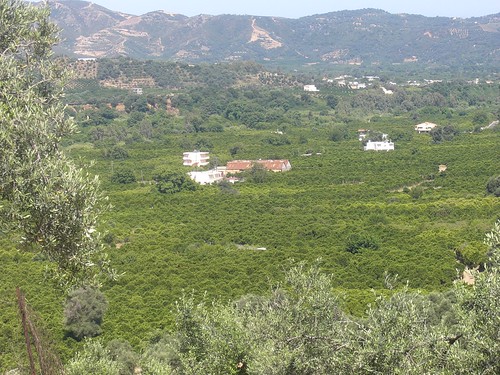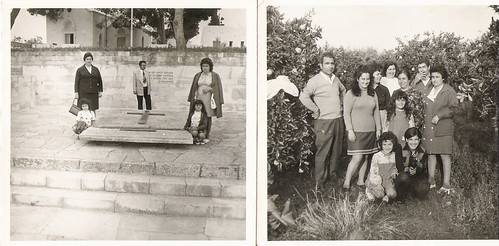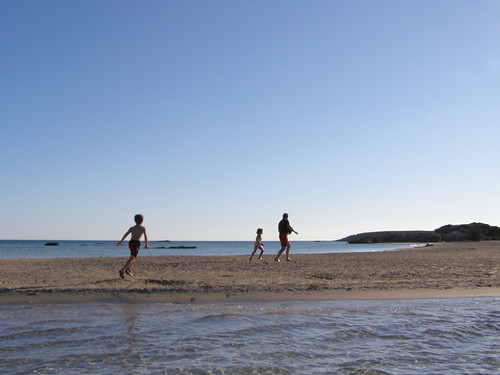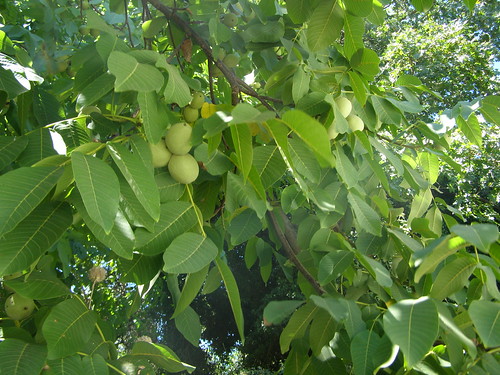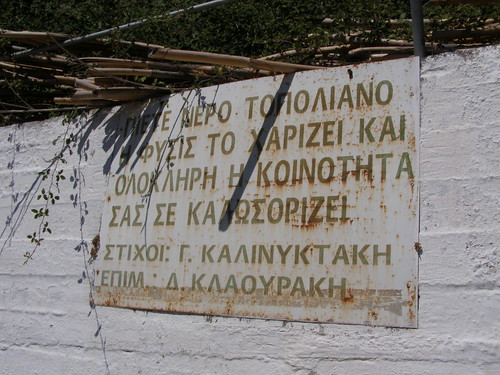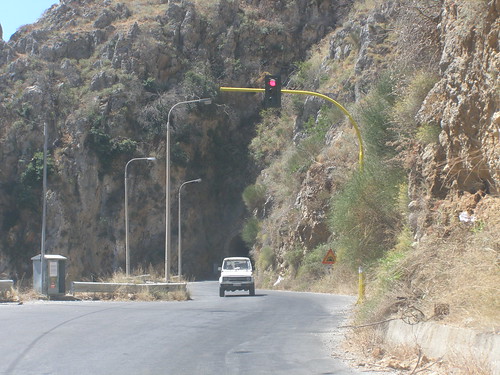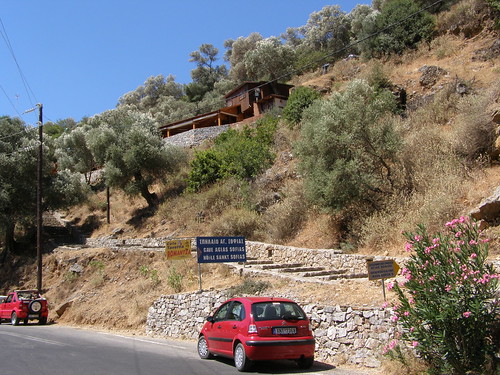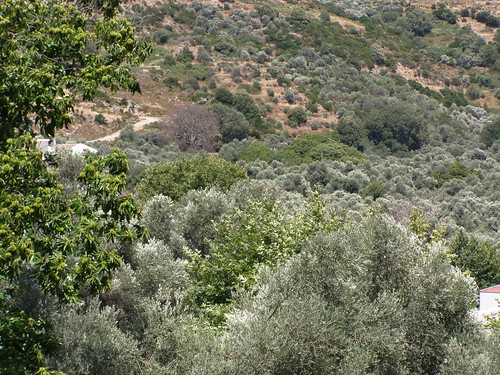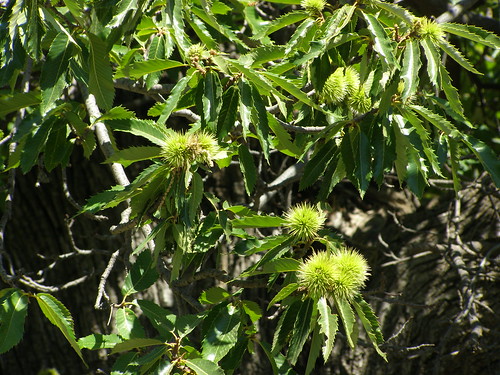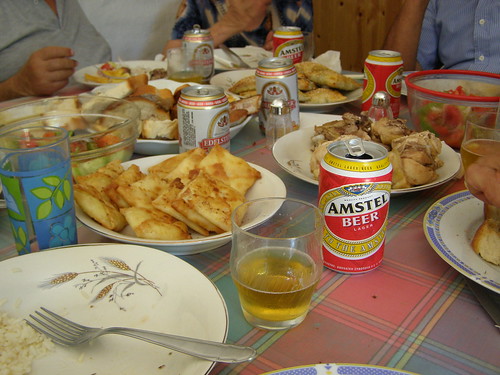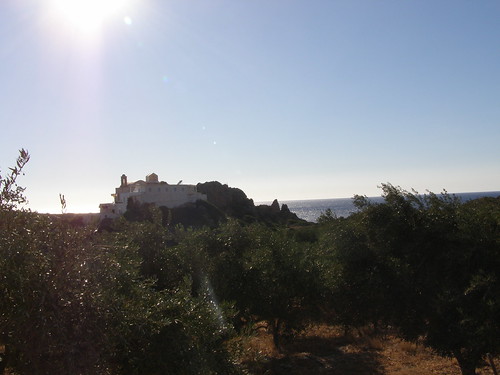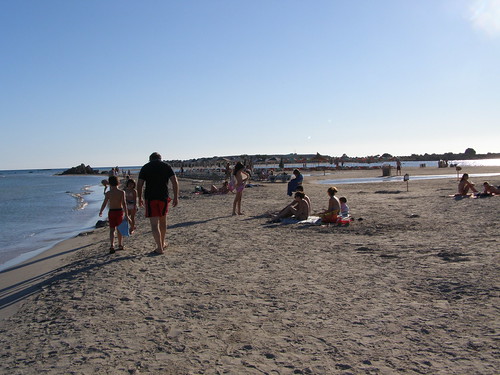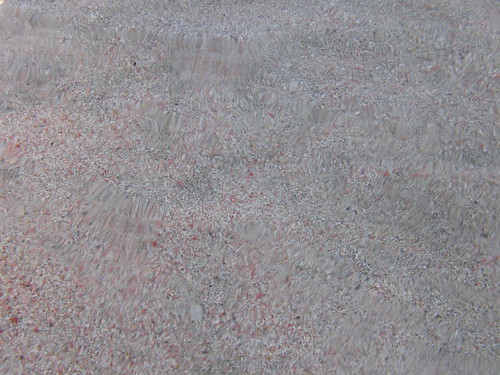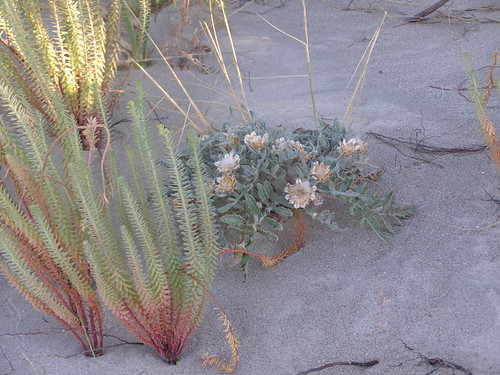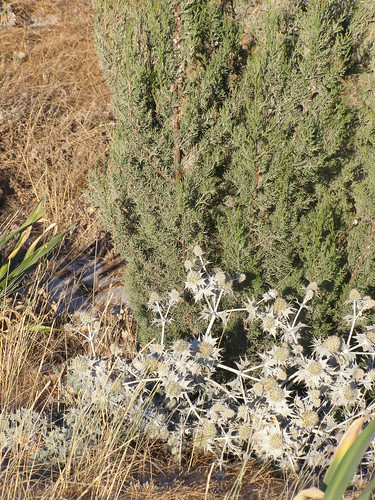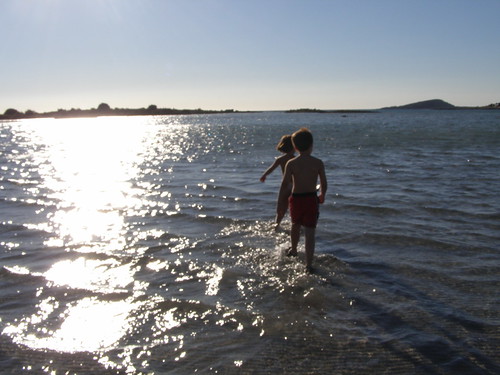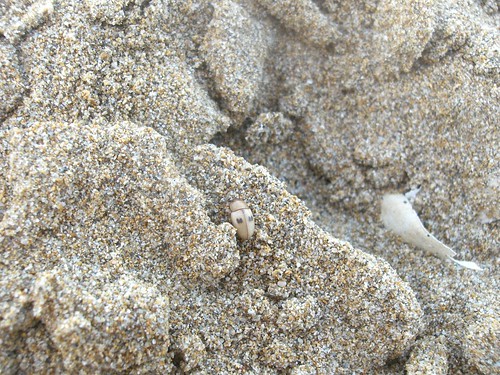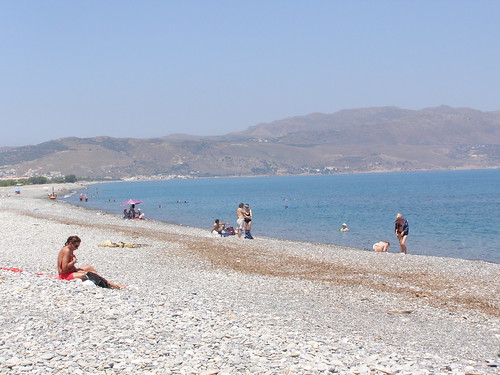
But there’s another reason why I personally dislike going out for a meal in Hania, whether it’s winter or summer; all the restaurants in the province have the same menu. They serve exactly the same food, as I'm sure most tourists will attest to when asked what they thought of the food in Hania. There is no taste sensation going on here; it's the same food being served up, with only the slightest of variations, depending on the cook, and maybe the quality of the ingredients used. And that’s not all; the same food is served up that any Haniotissa wife and mother would cook on a regular basis for her family; yemista, stifado, horta, kalitsounia, gigandes, you name it. Or maybe I lie; to date, I have never seen fasolada on the menu, and once when I did see fakes on the menu, it wasn’t actually available. We do have one or two Chinese restaurants in the town, but the menu tends to be very pricey, if the set takeaway menu price is anything to go by (30 euro for two people). But that’s about it.
Of course, there are places that serve well-cooked meals; maybe not so interesting, but at least they are very tasty. You just have to know where to go. One of the places you shouldn't go for that kins of meal is a taverna in a tourist area. Beachside tavernas are always a risky choice. You simply never know what you're up against: a restaurant that takes great pride in the food it serves to the here-today-gone-tomorrows, or one that sees this as a good reason not to go to too much bother in the first place. In the shoes of the customer, how do you choose a good place to eat on a sweltering hot day by the beach in an area slightly off the beaten track on a Greek island? After a swim under the brillliant yellow sun in the diamond-encrusted Mediterranean sea, you will probably be hungry, or will get hungry very quickly when the smells of lunchtime grills working in over-drive waft past your nose, whether you're a tourist or a local.
My family's once-a-month outings landed us at Periyiali in Tavronitis with some friends from Athens who were visiting relatives in the area; we decided to go out and meet them in their territory. Living mainly in the big Greek smog, they were pretty much tourists themselves, so it didn't surprise us that they chose the closest, flashiest eaterie near the beach, the one with an impressive round beach bar featuring an array of alcoholic beverages, the one with loud pop music blaring from the speakers, the one where the menu was dictated by the clientele: everyone had just come off the beach, and was bound to head straight back onto a deckchair once they had had their meals. The Northern Europeans were already looking like boiled shrimps. In the summer, there is an endless choice of places to go, but dining by the beach means you have to put up with tourist menus. Even the best diners in the whole town suffer under the pressure of serving well-cooked meals as quickly as the seats are vacated. If you want a high-quality meal in the middle of the summer in Greece, find a friend's house. Don't expect to find a gourmet meal in a summer resort town where package tourists have been flying in at the rate of 40-50 direct flights a day from Northern Europe.
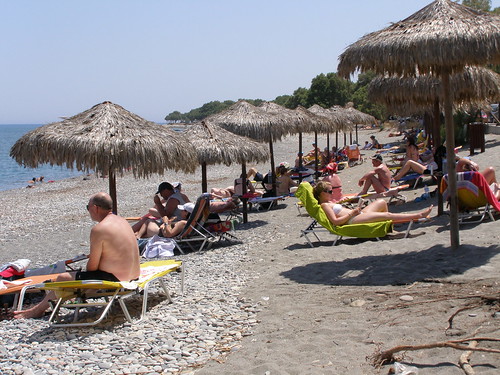
"We come here all the time," they told us, "the owner's a friend of the family." Another thing to avoid when you go to a taverna; no matter how bad the service or the food is, the owner will still be a friend of the family.
"Let's order," said our friends, without even looking at the menu card. This is not unusual; Greeks usually ask to be told the menu by the waiter, which also hints at an aspect of the Greek psyche that may need some explanation: the Greek people have an oratory culture - they are better listeners rather than good readers. Mobile phones have helped advance their talents in this respect; emails simply never caught on. This is why I've lost touch with most of my Greek friends; most of them give me their landline or mobile phone number. They have no idea about computer telecommunication, or what Skype is. Even if they own a computer, they aren't usually connected to the internet. Go ahead, google it: only a third of the Greek population uses the internet; to shock your pants off, here's another interesting bit of trivia: Greek internet users form just over 1% of the users of the internet in the whole of Europe. Of the 27 countries in the EU, Greece ranks in the 14th place for internet usage, well below Romania, who only just entered the EU recently. This angers me, but maybe I should just leave behind some of my New Zealand baggage; paying a shrink to find out why I feel like this is a waste of money, as I already know why. Ηas one not heard of the phrase 'γνώση σε αυτόν' (gnosi se auton)?
I suggested we see the menu cards anyway. There was a wide variety of meals of available, everything that one would expect to see on a Greek menu, organised in the typical way that Greeks organise their menus: appetisers, salad, grills, pizzas, pasta, and traditional Creto-Greco food, which consisted of all the meals we normally cook in our own home in the summer - boureki, moussaka, pastitsio, yemista, fasolakia. There was nothing unexpected or out of the ordinary. I wonder how they would approach a slight menu change: instead of pizza, they could add a vegetarian ladenia; instead of saganaki cheese, how about bouyiourdi?
We sat at a table close to the road next to the beach. The view was wonderfully peaceful, beautiful. It's a pity the tavern had half the windows closed; the outdoor space surrounded the bar which had a lot of business from the foreign tourists filling their beer guts. As soon as we took our seats, along comes a very polite waitress with the bottled water (which we didn't ask for). Why they didn't bring us tap water is a mystery to me - were they really thinking about the money they would make from selling a bottle of water? Bread is only to be bought to the table when it's asked for (new governmental rules since last year), but that came too. I could see that our taverna meal was going to end up costing us more than the most expensive restaurant in the province.
Both families had children with them. Choosing restaurant meals for the children gets easier as they get older. They have their standard favorites: fried squid (kalamari), pizza, chips and salad (or salad oil for dunking for those not keen on greens). We also have our own set favorites when eating at beach tavernas and other suspect eateries: bifteki burgers. You really can't go wrong here, since the plate usually contains some salad and fries on the side. Our friends had completely different ideas about what to order:

"What are you having, Maria?" asked my holidaying friend.
"Oh, I'll have the leftovers from my kids' choices?"
"You're not having a main meal?!?" she exclaims.
"No, they've ordered more than enough for all of us." My husband had also ordered a serving of stuffed bifteki, and with the hors d'oeuvres that were bound to be ordered with our Athenian tourist visitors, we would be feeling stuffed before the mains even come.
"Calamari, chips and pizza? They're just appetisers! What are they having for mains?"
"That's their main meal."
"Well, you order a main then." Sometimes, Greeks are 'too much'.
"They won't eat everything."
"Oh, why not? My kids can eat two plates each." And they certain ly looked as though they could: as primary-school children with their pregnant stomachs and tree stumps for legs, they walked around on their flattened hobbit-like feet like teletubbies.
I stayed firm. "I'm not having a main."
She shrugged and left it at that. Along comes the waiter. "Ready to order?" My friend asked me to give my family's order first. My son called out 'calamari' while my daughter called out 'pizza'. I asked for a serving of stuffed bifteki and a separate order of fries.
"Hey, how many servings of fries d'you want? I can't listen to everyone's order separately," boomed the pot-bellied waiter, who might have been having a hard day, but that was not my problem. I let the others do the talking; they were expert at taverna ordering:
"Let's have three fries, make that four, one with staka, three tzatziki - is that too many? OK, make it two tzatziki - one large combination salad with some dakos, another stuffed bifteki for you, one shrimp saganaki for me, one paeedakia (lamb chops) for my daughter and one grilled octopus in wine sauce for my son (?!?), and let's see, is that enough?" Speak to Greek taverna owners and they will tell you that there are no better customers than Greeks, because they order a lot of food, whether they eat it or not; they leave money for the time they spend at the table, not like the tourists who order two plates and a salad to be shared among four people over a period of two hours.
"May I suggest the mixed fried vegetables (courgettes, aubergines and mushrooms) to go with the tzatziki?" asked the now happy smiling friendly waiter, who could see we were over-ordering, especially since he didn't bother telling us that the biftekia, octopus and paeedakia each came with their own serving of fries.
"Great," my cheery friend agreed. "And a couple of cold beers with that, thanks. Could you just make sure that the paeedakia have a bone, you know, I want them to look like little pork chops with the bone, you know?" She brought her hands up to her face, joined together the thumbs and forefingers, and pulled her hands across in the shape of a rib-bone smile. "It's for a child," she added, with a knowing look on her smiling face. Her daughter must be a very fussy eater.
"Could we have a couple of Cokes, too?" I added.
"Aren't you having any beer, Maria? Why don't you order one bottle of Coke at a time so they bring it to you cold?"
"They're for the children." I never drink alcohol when we go out, because I always end up doing the driving, as if I'm being punished for demanding a no-cooking day. And the children never have fizzy drinks at home. Today is treat day; anything is permissible.
"Your children drink Coke? Oh, wow, our children never drink soda or pop drinks. They only drink water."
There's a time and a place for everything. I had kept my mouth shut long enough. That was enough to get me started. "Why are they so fat then?" I asked innocently with a bewildered look on my face. "And how on earth did they require 1000 euro worth of dental treatment each?" The conversation topic took a 180-degree turn after that: the price of petrol is crippling their use of the SUV in Athens, air-conditioning is a way of life if you live in an apartment, you need more than 100 euro in your pocket each time you go to the supermarket, all topics of unknown quantity to us rural dwellers living off a garden surrounding a detached house all within short distance of our local big smoke, Hania.
Some of the plates we ordered started drifting onto our table. Some dishes came on time (chips and kalamari), others needed a little longer (paeedakia and biftekia), while some never came at all (pizza). The salad had far too much dill, and the salad ingredients did not blend well. We were treated to sugary watermelon and tasteless cherries at the end of the meal. Total cost: 102 euro, for what was basically grilled and fast food (pizza not included).

At least the beach at Tavronitis did not fail to disappoint: it was perfect for swimming - crystal clear water in the shade of the blue in the Greek flag, a pebbly beach with little sand and plenty of shade. Mind you, it isn't shallow: after about two metres in from the shore, the water becomes too deep for children who are used to wading around Kalamaki Beach for a good twenty metres. Next time we're in the Tavronitis area, we'll stick to Anemomilos, just down the road from Periyiali, the no-nonsense place which makes no pretentious claims to what it offers: fast food at decent prices.
©All Rights Reserved/Organically cooked. No part of this blog may be reproduced and/or copied by any means without prior consent from Maria Verivaki.

